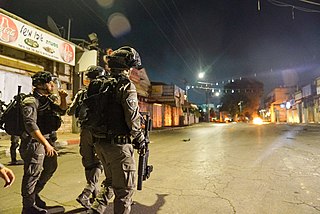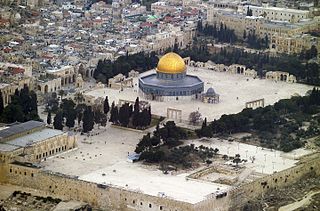This page is a partial listing of incidents of violence in the Israeli-Palestinian conflict in 2005.
This is the Timeline of the Israeli–Palestinian conflict in 2007.

Since 2001, Palestinian militants have launched tens of thousands of rocket and mortar attacks on Israel from the Gaza Strip as part of the continuing Israeli–Palestinian conflict. The attacks, widely condemned for targeting civilians, have been described as terrorism by the United Nations, the European Union, and Israeli officials, and are defined as war crimes by human rights groups Amnesty International and Human Rights Watch. The international community considers indiscriminate attacks on civilian targets to be illegal under international law. Palestinian militants say rocket attacks are a response to Israel's blockade of Gaza, but the Palestinian Authority has condemned them and says rocket attacks undermine peace.

The History of the Israel Air Force begins in May 1948, shortly after the formation of the State of Israel. Following Israel's declaration of independence on May 14, its pre-state national institutions transformed into the agencies of a state, and on May 26, 1948, the Israeli Air Force was formed. Beginning with a small collection of light aircraft, the force soon transformed into a comprehensive fighting force. It has since participated in several wars and numerous engagements, becoming what has been described as "The mightiest air force in the Middle East".

A major outbreak of violence in the ongoing Israeli–Palestinian conflict commenced on 10 May 2021, though disturbances took place earlier, and continued until a ceasefire came into effect on 21 May. It was marked by protests and police riot control, rocket attacks on Israel by Hamas and Palestinian Islamic Jihad (PIJ), and Israeli airstrikes in the Gaza Strip. The crisis was triggered on 6 May, when Palestinians in East Jerusalem began protesting over an anticipated decision of the Supreme Court of Israel on the eviction of six Palestinian families in the East Jerusalem neighborhood of Sheikh Jarrah. Under international law, the area, effectively annexed by Israel in 1980, is a part of the Israeli-occupied West Bank; On 7 May, according to Israel's Channel 12, Palestinians threw stones at Israeli police forces, who then stormed the Al-Aqsa Mosque compound using tear gas, rubber bullets, and stun grenades. The crisis prompted protests around the world as well as official reactions from world leaders.
The following is a timeline of events during the Israeli–Palestinian conflict in 2021, including the 2021 Israel–Palestine crisis.
The year 2023 in Israel was defined first by wide-scale protests against a proposed judicial reform, and then by the Hamas-led attack on Israel on October 7, which led to a war and to Israel invading the Gaza Strip.
Events in the year 2022 in the Palestinian territories.

A series of violent confrontations occurred between Palestinians and Israeli police at the Al-Aqsa Mosque compound in Jerusalem in April 2023. After the evening Ramadan prayer, Palestinians barricaded themselves inside the mosque, prompted by reports that Jews planned to sacrifice a goat at the site. In response, Israeli police raided the mosque in riot gear, injuring 50 people and arresting at least 400.

On 6 April 2023, dozens of rockets were fired from Lebanon into Israel, wounding 3 Israeli civilians. The Israel government alleged that the rockets were fired by Palestinian factions Hamas and Palestinian Islamic Jihad, with Hezbollah's approval.

On 8 October 2023, the Lebanese militant group Hezbollah, taking advantage of the Israel–Hamas war, fired guided rockets and artillery shells at Israeli positions in the disputed Shebaa Farms. Israel retaliated by launching drone strikes and artillery shells at Hezbollah positions near Lebanon's boundary with the Israeli-occupied Golan Heights. The outbreak of the conflict had followed Hezbollah's declaration of support and praise for the Hamas attack on Israel, which took place on 7 October. Clashes subsequently escalated to reach other parts of the Israel-Lebanon border and onto Syria and the occupied Golan Heights. It is currently the largest escalation of the Hezbollah–Israel conflict to have occurred since the 2006 Lebanon War.
This is a chronological timeline of the Israel–Hezbollah conflict since October 2023.
Since the beginning of the Israel–Hamas war, which has mostly been confined to southern Israel and the Gaza Strip, a number of armed clashes and standoffs have been reported in other parts of the Middle East, particularly involving Shia Islamist militias backed by Iran. There has been speculation that any escalation of these incidents, specifically between Israel and Hezbollah—an Iranian-backed Shia militia which is based in southern Lebanon and which is more powerful than the Lebanese Armed Forces —could bring the entire region into a full-scale military conflict. In addition to the Israel–Hezbollah conflict, the Iranian-backed Houthi militia—which controls parts of northern Yemen, but is not internationally recognized as the country's government —became directly involved in the conflict by firing missiles at Israeli cities, albeit on a limited scale; the Houthis have since focused more on seizing civilian cargo ships passing through the Red Sea in order to inflict economic losses on Israel and the global economy, evoking American and British airstrikes against Houthi-controlled Yemen. Iranian-backed militias in Iraq and Syria have also mounted numerous attacks against American military bases in the region; these confrontations have increasingly escalated tensions between long-time adversaries Iran and the United States, especially after the 2024 Iranian missile strikes in Iraq and Syria. In the West Bank, over 100 Palestinians have been killed in armed confrontations with Israeli soldiers and Israeli settlers, as violence in the territory increased drastically following the Hamas-led attack on Israel.






